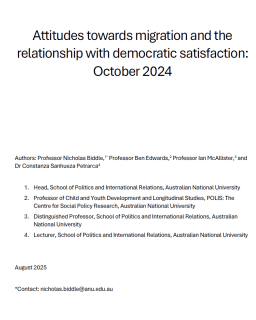
Abstract
This paper explores the intersection of attitudes toward migration and satisfaction with democracy in Australia and Europe, using data from the Australian Social Survey International-ESS (AUSSI-ESS) conducted in October 2024 and the European Social Survey (ESS). The analysis highlights how Australians’ perceptions of migration have evolved since 2020 and compares these to attitudes in 24 European countries. While Australians generally support migration, the perceived economic, cultural, and social benefits of migration have slightly declined over the past five years.
Australians remain more supportive of migration than most European countries, clustering with Nordic and Anglo-Celtic nations. The study examines demographic and socioeconomic factors influencing migration attitudes, finding that younger individuals, those with higher education, and overseas-born Australians hold more positive views. Individuals identifying as a different race or ethnicity than the majority are less likely to perceive migration benefits, a trend that persists across statistical models.
A key finding is the positive correlation between perceptions of migration benefits and satisfaction with democracy. Countries and individuals with favourable views on migration express higher levels of democratic satisfaction, even when controlling for other factors. These results underscore the role of inclusive policies and public narratives in fostering democratic cohesion. The paper concludes by emphasising the need for balanced migration policies that address both economic and cultural dimensions that underpin more resilient democracies.
File attachments
| Attachment | Size |
|---|---|
| Resilient-Democracy---Discussion-Paper-08---Biddle-et-al---For-web.pdf(554.88 KB) | 554.88 KB |